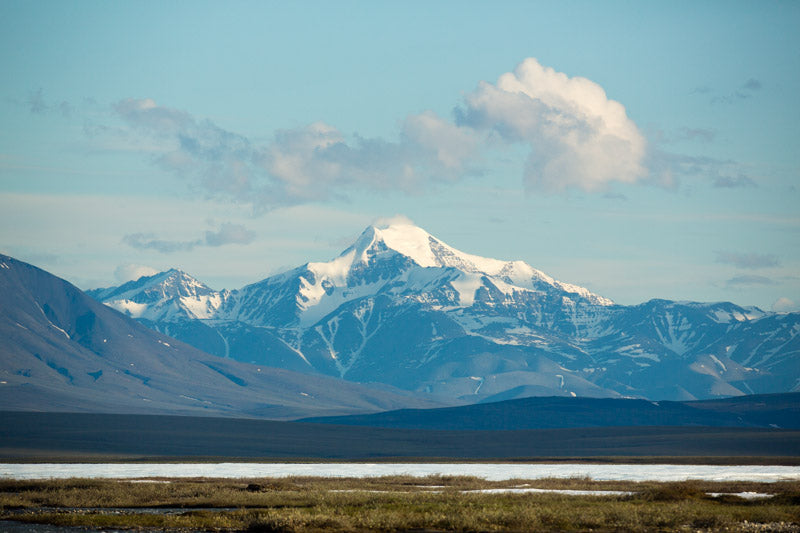Our Wild - Alaska

by Ian Ramsey
Eleven years ago, my life was forever changed when I was dropped off by a bush plane on a treeless expanse of tundra. I spent the next three weeks on foot, in Alaska’s Arctic National Wildlife Refuge, following the Porcupine Caribou herd in their annual migration across the Brooks Range. The herd, nearly 200,000 strong, has migrated for millennia, traveling every spring from their winter range in the Yukon to the coastal plain of the Beaufort Sea, where they calve, and then spend the short Arctic summer migrating back to the Yukon. As the sun spun like a disco ball at the top of the sky, I hobbled, stumped, limped, and staggered under an 80 pound pack alongside thousands of caribou, many of them only a few days old, following the ice-plugged Achilik river from the coastal plain, up into increasingly scree-and-rock mountains. I got stuck in a July blizzard, watched wolverines prowl and Golden eagles soar, nearly died descending a scree cliff, and did not see a single human being. One bright, sunny midnight I drowsily staggered out of my tent, only to see the ample back end of a surprised grizzly galloping away faster than a racehorse. I thought to my uncomprehending self that no hind quarters should be that big.


To travel to the Arctic Refuge is to see the Earth as it was 50,000 years ago, when big herds migrated across open spaces, and humans didn’t try to run the show. To be there is to realize that you’re just another mammal, all biology and sex and instinct, in close alignment with the Earth. You smell things. Things smell you. After a few days, you start to sense things in extrasensory ways, as in, "Holy Shit! I KNOW there is a 700 pound bear on the other side of this ridge, even if I don’t know how I know that." In the Beaufort sea, Polar Bears big as Land Rovers swim between icebergs big as ranch houses. In the mountains you run into that slow-moving Pleistocene holdover, the Musk Oxen, that looks like a cross between a Muppet and one of the creatures in The Empire Strikes Back. After you’ve sat in a valley bustling with ten thousand caribou, you’re not the same person.

The Arctic Refuge -with all its unparalleled biological diversity, remote wildness and jawdropping landscape, is to Wilderness as Lebron James is to basketball –it’s the gold standard, the Big Kahuna, the Michelin Three Star, the Valedictorian of deep ecological coherence and beauty. And this fragile and ecologically sensitive ecosystem is in danger. For decades, activists have managed to keep oil companies from drilling on the very coastal plain where those nearly 200,000 caribou give birth every spring, as they have for millennia. The coastal plain, which holds oil reserves, has been a target of the energy industry for decades. As the birthing ground for the Caribou and the most important onshore denning ground for America’s vanishing Polar bear population, it is also the biological heart of the refuge. Seismic testing, aircraft, road-building, drilling, oil-pumping, oil-spilling, oil-burning: ANY, let alone ALL of these activities would mean the end of the sensitive Polar Bear denning and Caribou birthing, which would mean the end of not only those magnificent populations, but all of the other species that depend on them, and of the Gwich’in native population, which has based its entire culture around the Caribou for millennia. I’m not sure that cultural and ecological genocide is worth, maybe, six months of oil. But, as we face a new Presidential administration that refutes climate change and promises to double down on resource extraction, it is very possible that we could lose the crown jewel of American Wilderness.

I’ll probably never go back to the Arctic Refuge, and I don’t need to. My life is richer for knowing that there is still a place where tens of thousands of big animals migrate and raise their young, where biology still moves along relatively free of human impact, where Wolves hunt and Polar Bears swim and ice-choked rivers without dams flow down mountains so beautiful that they make you cry. My life is so rich with the knowledge that there are places on this earth where humans have had the wisdom and character to not drill, not dam, not build roads, to just let things be. We are all richer for this Sabbath for the Earth. Let’s keep it that way.


Our last truly wild frontier is in danger of being industrialized by oil drilling and all the infrastructure that comes with it. It is time to stand up for preserving this pristine refuge, the wildlife that exists there and a place almost untouched by humans.
Momentum is building right this moment. On Tuesday April 4th, lawmakers from around the country introduced legislation to protect the refuge.